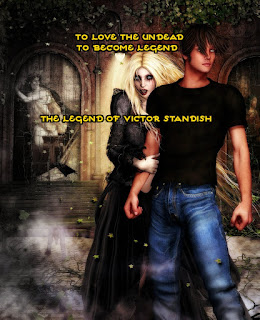COMING SOON!
I am quite fortunate to have Robert Rossmann as graphic designer of my audiobook cover
(didn't he do a fantastic job?)
And he is also the narrator of the book as well.
Robert Rossmann played would-be producer Max Bialystock in "The Producers"this July at Sierra Stages in Nevada City --
before then, he played Vanya in Christopher Durang's "Vanya and Sonia and Masha and Spike" this past spring,
and he has played, among other roles, Willie Loman in Arthur Miller's "Death of a Salesman"
and Pseudolus in Stephen Sondheim's "A Funny Thing Happened on the Way to the Forum".
{Robert is on the left}
WHAT DO I MEAN BEST WRITING TEACHER YOU CAN BUY FOR $15?
1) YOU ABSORB DIFFERENT STYLES OF THE MASTERS
Listen for a week to a book by Hemingway, and when you next write, you will discover your phrasing, dialogue, and plotting will be colored by the master.
Listen to many great writers, and your writing style will become deepened and enriched.
2.) WE LEARN BY LISTENING
Music teachers know this.
They send students home with professional recordings
so they can absorb the
“tone” of a particular instrument.
They accompany students on the piano so
they can hear how two parts should flow together.
We learn a second language in a similar manner.
3.) THE "EARS," NOT THE EYES, HAVE IT
Turns out the ears are extremely important to a writer.
You need to be
able to “hear” how your prose is sounding,
and if you have a good ear,
you can detect the problems just by listening.
When you read your draft out loud or listen to someone else read it,
your brain gets the information in a new way, and you may notice things
that you didn’t see before.
But you need to see how the professional does it -- and no way is better than listening to their prose.
4.) AUDIOBOOKS FORCE YOU TO PAY ATTENTION
No skimming. You take in all the words and see what impact they make.
Audiobooks have taught me a lot more about the importance of the rhythm of
language.
Good writing has a musical quality to it, a mathematical
quality, a balance and a rhythm.
You can "feel" the prose that much better when it’s
read aloud.
One other thing I notice when reading audiobooks:
You have to tune
in.
Zone out for even a few seconds and you lose the train of the story.
That’s good for developing focus,
but also helps your brain really pay
attention to the words, the rhythm of the phrases, and the way the story
flows.
Even when reading a book,
we can get caught up in the story and zoom
through the pages without really registering the prose.
Impossible to do
when you’re listening. You have to focus on what you’re hearing.
5.) COLOR YOUR WORLD WITH SOUND
Don’t worry about being overly influenced.
Your brain has a way of
taking what it receives, churning it up, and spewing out something
that’s yours.
It’s what we writers do all the time, with everything else
we’re exposed to in life.
The best way I can describe the subtle but profound shift is that as I
write,
I hear the story in my head as if someone else is narrating it.
This small change gives me some distance from the story and allows me to
better assess my work-in-progress as a reader.
It makes me want to make
my sentence structure, diction, and punctuation a clear road map to
show the reader how the story should sound.
TRY IT.
YOU WILL BE AMAZED AT THE AUDIO IMPACT
Of course, I would like you to buy mine --
but the public library has thousands of audiobooks you can listen to for FREE!
Please Buy Food Guy's Audio Books












































































































































































































